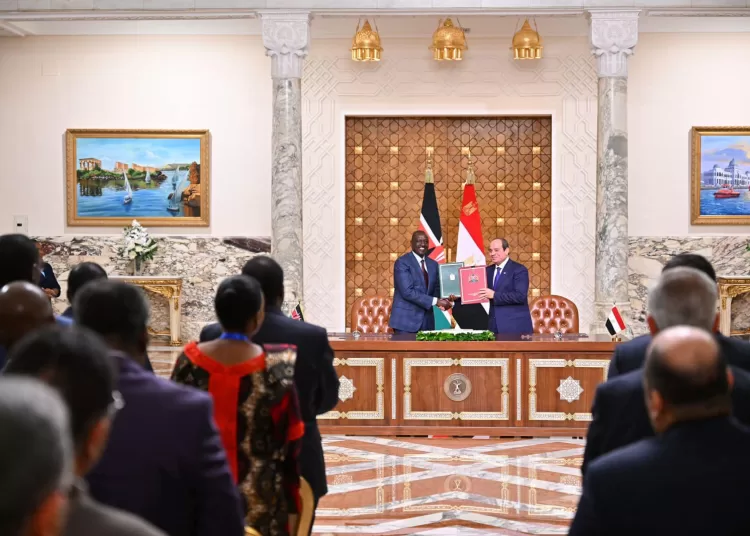Egypt has exerted tireless efforts to strengthen relations with African nations at all levels and on all fronts.
These efforts play a crucial role in bolstering Egypt’s national security and advancing its vital interests.
These relations are grounded in shared political, geographical, economic, and cultural ties between Egypt and African countries, both historically and at present, analysts said.
“This deepened engagement with African nations is more necessary now than ever before in the face of geopolitical developments that create security, political, and economic challenges in the region and the world,” Diaa Rashwan, head of the State Information Service, the media arm of the Egyptian presidency, said.
He highlighted Egypt’s moves to bolster its co-operation ties with African nations, particularly with Nile Basin countries and those in the Horn of Africa.
These moves, he said, are evidenced in regular meetings by the political leadership with senior officials and leaders of African states.
Kenya-Egypt ties
The latest of such meetings took place between President Abdel Fattah El Sisi and visiting Kenya President William Ruto in the Presidential Palace in Cairo on Wednesday.
During the meeting, the two leaders signed a joint declaration to elevate their two countries’ relations to a new level and boost partnerships between them in various fields.
The Egyptian and the Kenyan governments also signed 12 agreements and memorandums of understanding that expand their co-operation into various sectors.
These deals will hopefully strengthen trade, investment, education and research co-operation between Cairo and Nairobi.
They will also bolster technological exchanges between them and unlock immense opportunities for their citizens.
The aforementioned deals included one on political consultations, another on diplomatic training in capacity building in the Foreign Service, and a third on investment co-operation.
Egypt and Kenya also agreed to intensify efforts to ensure the full and swift implementation of the African Continental Free Trade Area.
They also agreed to establish an Egyptian-Kenyan business council to explore new trade and investment opportunities.
As for security and counter-terrorism co-operation, the two countries agreed to exchange relevant expertise in counter-terrorism approaches, which cover the military, security, intellectual, environmental, and developmental dimensions.
The two presidents also reaffirmed their commitment to work together to address conflicts in Africa through adopting a comprehensive approach to address the root causes of these conflicts via regional and international initiatives aimed at building and sustaining peace and development.
Comprehensive strategy
The government has recently formed a committee tasked with developing an action plan and a comprehensive strategy aimed at doubling Egypt’s exports to African countries by 2025.
The strategy ensures that Egypt adopts an export-oriented working plan to address the needs of African markets, Minister of Planning, Economic Development and International Co-operation, Rania al-Mashat, said recently.
The strategy’s most prominent goal is to raise Egyptian exports to Africa to $10 billion by 2025, the minister said.
Boosting co-operation between Egypt and African countries is a top priority that the Ministry of Planning seeks to achieve through many files, including promoting co-operation in the fields of sustainable development and capacity building, Mashat added.
Inclusive development
Egypt seeks to achieve comprehensive, inclusive and sustainable development in Africa by sharing expertise with several countries on the continent.
Tanzania’s mega development project, the Julius Nyerere Hydroelectric Power Project, is a clear example in this regard. The project is constructed by an Egyptian consortium.
Around 1,025 metres long, with a storage capacity of 34 billion cubic metres, the dam aims to double Tanzania’s energy production, control floods, and improve agriculture.
The $2.9 billion dam will solve the country’s electricity shortage problem by providing clean power for more than 60 million Tanzanians.
The energy generated by the dam will be transmitted at a voltage of 400 kilovolts to a substation, where it will be integrated into the national electricity grid.
The project, under construction since 2019, is implemented through a joint venture of two Egyptian companies: the state-owned Arab Contractors Company and the privately owned El-Sewedy Electric.
This huge Tanzanian development project is a model for co-operation between African countries, Prime Minister Moustafa Madbouli said in a recent statement.
He highlighted the importance of expertise-sharing between African countries, citing Egypt’s pioneering development experience in infrastructure over the past ten years.
The prime minister revealed that Egypt has invested a whopping $170 billion in infrastructure in those ten years.





